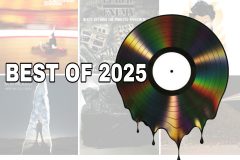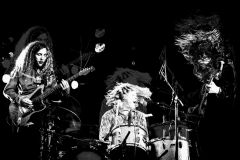The time is now and I don’t want to trivialize anything but it’s 2021 and if you’re going to come at listeners, originality is key, wouldn’t you agree? I literally hate making obvious comparisons but I’m not even certain bands, or listeners for that matter, would recognize if I offered them up. But there’s a definitive need for it here. The Damn Straights have just released its eponymous 4-song EP (Bastion Music Group) and it seems the group is offering up a lot of different things we’ve heard before. The San Diego outfit seems to suffer from an identity crisis. The opening “The World’s On Fire (Let It Burn)” is a track we all probably want to start repeating “MY NAME IS…MY NAME IS…MY NAME IS” without having to actually calling out who emcee Herbal T is reminiscent of here as his cadence is delivered circa 1999. The band hits hard but that beat and melody is quite similar. Throughout the remainder of this release you’ll hear semblances of the wacked out King Missile and possibly Gwen Stefani’s old outfit. It’s an energetic attempt here but it’s lacking originality for the most part.
One hundred years from now whatever we’ve been going through today isn’t going to matter when our bodies rest on mantles, caskets, and possibly even shallow graves. The Michigan-based Lasso is best known for his production work with intuitive rapper Lando Chill on 2017’s The Boy Who Spoke To The Wind, and 2018’s Black Ego. Last year The Lasso released a collaborative album with Elucid as Small Bills entitled Don’t Play It Straight, as well as another collab with Psypiritual, Kirlian. But this year The Lasso offers up his second solo release, 2121 (Mello Music Group). The album follows the same distinctive patterns, lacing beats with thick & groovy basslines with an array of guest appearances ranging like Hemlock Ernst on the bouncy “We Will Be Us Again?,” with Rachele Eve handling vocals alongside him (her voice is scattered all throughout the album), Ill Camille on the dreamy “No Illusions,” Fat Tony twisting words on “The Abyss,” and many more. It’s difficult not to enjoy The Lasso’s musical constructs, so why fight it? We should all be in, that is until we turn to dust.
We all have moments when we binge; whether it’s a television show, movies, or even food. Getting that sugary sweetness is sometimes important and on Psymon Spine’s sophomore release, Charismatic Megafauna (Northern Spy) that’s exactly what we get. The keyboard washes leaning against strong & healthy drum play allow for 80s electro-pop fit for the 21st century. This go around, Noah Prebish, Brother Michael Rudinski, and Peter Spears, all welcome Sabine Holler. From beginning to end the music on Charismatic Megafauna captivates listeners with a sound many attempt, but never seem to get right. While the band may veer in the direction of a long-lost decade, the music is drenched in melody everyone can enjoy. But(!), there’s always that one “but,” I’m trying to figure out why the track “Channels” was included within the mix. No, it’s not a bad song, it’s actually quite good but it’s out of place. The 80s sound is thrown off by the post-punk dance fervor of the song (think Mission of Burma, Gang of Four, early Radio 4). It sounds like a song by a different group altogether. It’s only one song and the distraction is minimal.
In the band’s 18-year existence, it’s proven that quality in music stands the test of time. Since the band’s earliest days, the members have always gotten a bad rap, receiving contempt within underground circles as some have accused the band of eschewing its punk roots through previous projects, instead finding solace comfortably along the mainstream. Now while members may have spent time in groups like Lifter Puller, The World/Inferno Friendship Society, etc. that may have rattled listeners, the growth of the band shouldn’t be held against it.
If you haven’t guessed it by now, I’m referring to The Hold Steady and its 8th album Open Door Policy (Positive Jams/Thirty Tigers). The album follows up 2019’s Thrashing Thru The Passion which is again what one would expect from the band, and after a five-year hiatus, it was welcomed. But where does that leave us with the new album? Well, it’s difficult to get past the opening “The Feelers,” not because it’s bad but because it’s just that enticing. The song revolves around relations, dealing with emotions, and to an extent drugs. It’s all-encompassing and makes listeners want to stay in that comfort zone. Once we’re able to move forward, “Spices” finds its way through, slowly embedding its melody, sideling in as it crescendos, building seamlessly within the blink of an eye. But it’s Craig Finn’s signature spoken-word delivery, fitted alongside the music’s classic feel in general that has captivated fans since the beginning.
Comparisons have been made to Springsteen but this is no Springsteen. It may be a jumping point for newcomers but both artists deliver their music so much differently. While much of the album revolves around relationships and the human condition in some form or another, it’s about the music and the feeling it evokes. “Lanyards” for example, plays a bit with dynamics but when the band becomes voluminous, yeah, it going to make you want to jump out of your seat. The guitars and piano mix melody and notes perfectly against one another to allow the song’s power to cast its energy widely, and the band members get it done with ease. With “Unpleasant Breakfast” the band finds its groove, just like Stella, and milks it for all its worth. Finn twists his words around false pharmaceutical realities, again within the framework of a relationship, but he paints pictures here conveying clear imagery. But it’s the music that’s flagrantly juxtaposed against his words. And that sound, I’m not sure if those are vocals or guitar effects filtered through. This time around though, it’s horns battling against a piano. Well, there might be more to that Springsteen similarity than we may have thought. The closing “Hangover Camera” holds tightly to a lazy delivery which works within the band’s favor as organs and lightly strummed guitars play against a steady rhythm as those guitars and horns soon harmonize against one another.
The Hold Steady sometimes gets a bum rap. Sure the band has embraced rock classic-isms the members would have eschewed in their younger days but as they’ve matured into adulthood, so has their tastes and styles. But honestly, who cares? Open Door Policy is an album filled with amazing tones and textures that would have many, young and old, left in awe.
Surprisingly enough, I’ve entered an undiscovered country that involves Drew Riekman, Reuben Houweling, Jake Holmes, and Mitchell Trainor, the members that make up the Canadian art-rock group Blessed. While this may be my first interaction with the band, the group has been releasing material since 2016’s releasing one album and a number of EPs. The band just dropped its new release, iii (Flemish Eye), a 4-song EP that’s more than …interesting.
Now while the EP is clearly identifiable as Blessed, no two songs on this release are the same. The band plays with instrumentation unlike any other group, making changes with songs varying its structures. The opening “Signs” is delicate until we hear guitar notes howling. In most cases this wouldn’t work but in this case it does, allowing the change to carefully merge within the context of the song itself. The tempo is altered more than halfway through it but again, it’s fitted snuggly and the band milks the melody for all its worth as breathy vocals echo in the background. In case you were wondering, I’m in.
The band plays with pop melodies on “Structure” as it allows the song halfway through to quietly elaborate on that melody with vocals, light percussion and a few guitar notes before shifting the dynamics right back to its dreamy soundscape. The band expounds on it, allowing the rhythm to find its own way as it comes to a close. The song in its entirety is utterly fascinating. But it’s within the more experimental “Centre” where I find solace in the band’s somewhat scattershot post-punk delivery. It moves with intention though, and the lyrics aren’t lost upon me as Reikman sings “So many things you can’t control,” giving semblance to the song’s own loose structure with no center, so to speak, as the group moves forward like a fierce battering ram. The band highlights the fact that each song was mixed by someone different, opting for less streamlining for a sense of abandon. This track handled by Holy Fuck’s Graham Walsh and it kind of shows, but in a majestic way.
If it was lost on you before, I did say I’m in. Blessed has made a new fan in me with its iii, which showcases an unrelenting urge to do things much differently than any of its contemporaries. It’s a feat that I can applaud, time and time again.
When the band first appeared back in 1997 with itss debut Young Team, there was no other group like it. Even 24 years later no group has been able to match the outfit’s fury, genius, and ingenuity. But it is 2021 and yet still, no one has come close to delivering something so unencumbered. The band’s last release, 2017’s Every Country’s Sun was a fantastic journey and allowed listeners an existential ride through the unknown. Now 4 years since the album, is the Scottish outfit still viable with its new material?
Mogwai has gone through member shifts but have been resilient since John Cummings departure back in 2015 and we learned through Every Country’s Sun that it’s not about the individual but the group. With As The Love Continues (Temporary Residence LTD.) we know it wasn’t a fluke. From the start, the music draws listeners in with its instrumentation. Given, the instruments utilized (guitar, bass, drums, keyboards, synths) are pretty standard but as they’re weaved together, the music is – for lack of a better word – existential. The opening “To The Bin My Friend, Tonight We Vacate Earth” builds around a simple melody but there’s nothing effortless about the music as it crescendos and fills all the space it has to work in, nary allowing a moment’s breath. But it isn’t over-the-top, with a comforting melody that allows the band to work smoothly and continuously until the song’s eventual end. On “Here, Here We, Here We Go Forever” guitarist/keyboard player Barry Burns utilizes electronic blips, misleading listeners into this massive piece of wall of guitars, keyboard washes, and steady rhythms as the blipping melody drifts away at some point. There are grandiose elements through much of Mogwai’s music, but it’s the group’s rising volumes that’s responsible for it. I’m never one to complain when it’s done with such elegance the way the band’s able to address its compositions.
Now while Mogwai has been known as an instrumental group, the band has at times offered up songs with guitarist Stuart Braithwaite handling vocals, backed by Barry Burns. It’s presented when it’s fitting, much like on “Ritchie Sacramento.” Breathy vocals lilt across ethereal guitars and a steady yet choppy rhythm that brings everything together as the band powers through with distorted guitars and bass, as they shifting effects on and off. Initially, I skimmed past the track but after repeated listens, the melody is inviting and captivating. The band experiments on songs like “Fuck Money” where the band members allow the song a mind of its own, letting it drift and building around the effected vocals before washing over it with waves of guitar, keyboard, and drums. The song leads directly into “Ceiling Granny,” possibly one of the band’s more straightforward numbers to date and it’s difficult not to fall in love with this instrumental. The band plays with dynamics as it has in the past, but it works. As it always does.
There are so many layers to Mogwai’s structures and makeup, it’s difficult to pull them all out at once. But As The Love Continues is fascinatingly delicate while also abrasive when it wants to be. It’s the perfect blend of both worlds. I can only imagine when strolling past the gates of heaven, Mogwai will be playing through virtual speakers. This is what we should all listen to when first meeting God.








Social Media